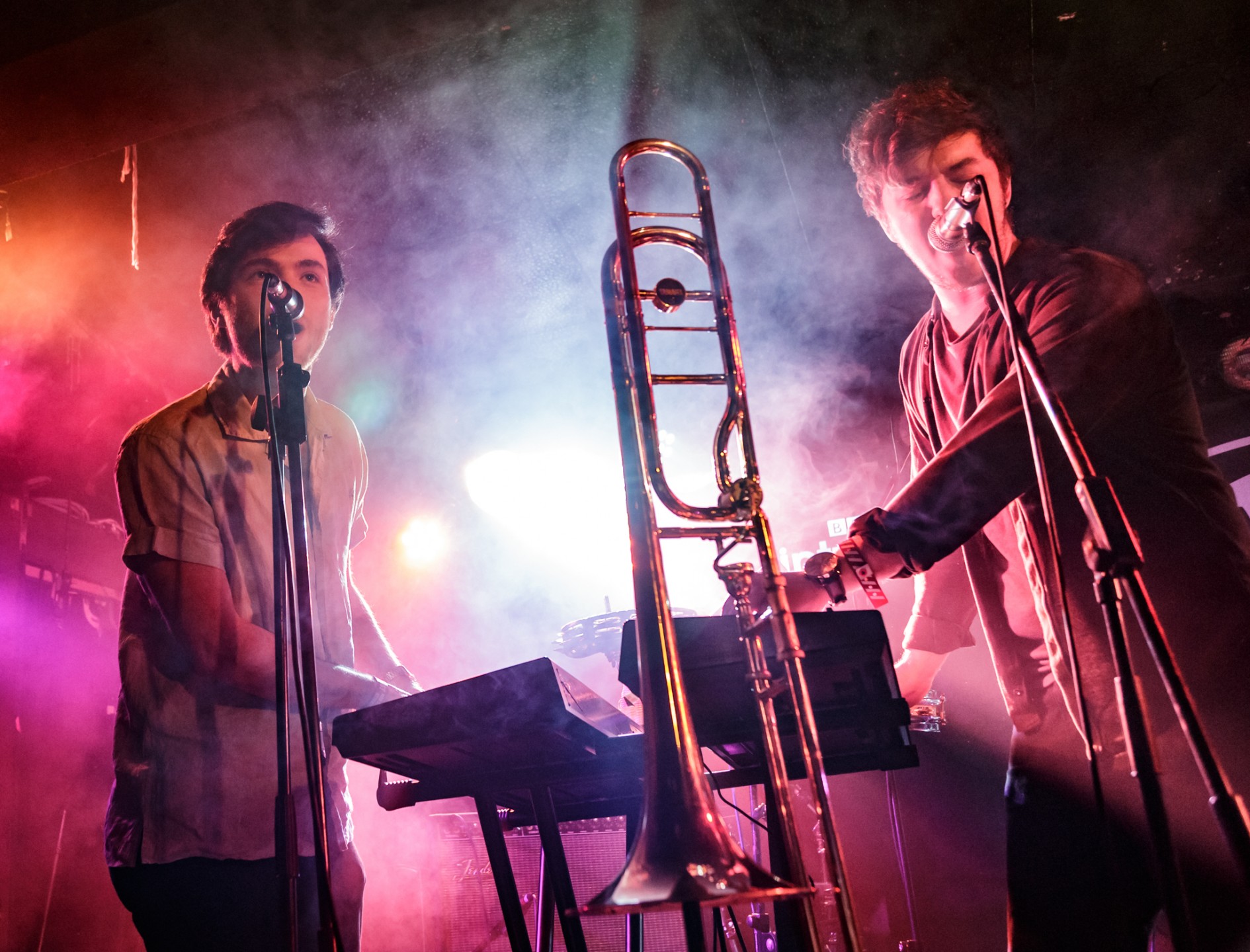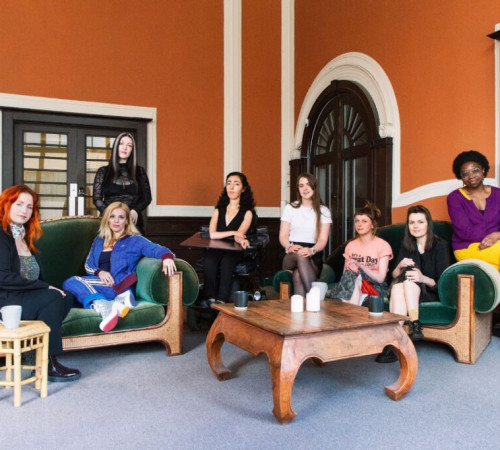 IN previous eras where underground success could quickly equate to propositions from major labels that would look to capitalise on a marketable product, the cultivation of a fiercely loyal grassroots fanbase was a key component in beginning to get the necessary traction. Whilst subcultures and genre-specific audiences still exist in a far more pared back and less all-encompassing form, the halcyon days of mod, punk, new wave and other momentous youth movements instilled an irrepressible sense of unity between band and fan that those in the business of promoting records to the masses couldn’t help but see as a clear cut sign of potential financial prosperity.
IN previous eras where underground success could quickly equate to propositions from major labels that would look to capitalise on a marketable product, the cultivation of a fiercely loyal grassroots fanbase was a key component in beginning to get the necessary traction. Whilst subcultures and genre-specific audiences still exist in a far more pared back and less all-encompassing form, the halcyon days of mod, punk, new wave and other momentous youth movements instilled an irrepressible sense of unity between band and fan that those in the business of promoting records to the masses couldn’t help but see as a clear cut sign of potential financial prosperity.
In 2017 on the other hand, the notion that an aspiring artist can impress a label by maintaining an impassioned following on a local level is all but a thing of the past as the ratio between risk and reward for majors continues to be skewed by diminishing album sales and markedly lower returns on investments. When viewed through a cynical and doom-laden lens, it is disheartening to know that the global explosions and subsequent spates of label acquisitions that were born of now canonised yet deeply organic uprisings of talent such as the groundbreaking CBGB’s scene, London as a fertile breeding ground of 70’s punk pioneers, Manchester’s creative boom period of the late 70’s and 80’s, Glasgow’s emergence as a hub for the finest in post punk and indie or even the NYC rock resurgence of the 00’s cannot be conceivably replicated in today’s climate.
While putting any misguided longing for what are once-in-a-lifetime moments in time to one side, it could be argued that the very idea of ardent admiration for a band is simply undergoing a period of experimentation and evolution. Made possible by the ever-present tool that is the world’s constant connectivity to the internet and its utilisation as a platform for emerging artists, it appears that the days of a musician’s fate resting in the hands of a powerful few are becoming less of a concern for those that can instil a deep-seated desire to hear more from them in an audience.
By uprooting from a belief in catering to an audience of your peers as that was all those artists of the past could realistically do as a fledgling talent and instead looking to expand your horizons to anyone with a willingness to pay a sum of any kind to hear your music via a crowdfunding model could well lead to the concept of a ‘grassroots following’ being redefined on a global scale. With the internet and social media’s encroaching importance in promotion putting paid to sole reliance on local scenes in provincial towns as your audience and transforming the battle to digital terrains in which anyone who’s perhaps been bowled over by a demo recording or caught a support slot can be kept firmly up to date with your progress and chart your every move, the adoption of crowdfunding sites such as Viagogo, PledgeMusic and Music Glue to cite just a couple of prominent services that have been used to great effect in recent years.
Although the general idea has essentially been around since the days of war bonds in the 18th century, the origins of crowdfunding being enlisted as a means of aiding new ventures can be traced to prog rockers Marillion after they booked an entire US tour after receiving £60,000 worth of donations from eager fans that wished to see them head stateside in 1997.
An example that predates any of the sites that are now employed by musicians of all varying sizes and from all over the world, it remains a sterling example of just how beneficial it can be in enabling those who’ve put in the time to inspire a high level of kinship with their fans.
Now enlisted by everyone from established artists to burgeoning talent, you don’t need to look any further than Scotland in order to see examples of how the fruits of a band’s labour can be converted into the capital required for new projects and releases.
Having launched himself as socially conscious modern-day troubadour with his pro-independence folk anthem ‘Hope Over Fear’ back in 2014, Castlemilk singer/songwriter Gerry Cinnamon epitomises just how effective this model can truly be.
Refusing to be pigeonholed as merely an invigorating live proposition after continually defying the odds with huge sets at festivals and emphatic headline shows, the plans to record and release his oft-discussed debut album began in earnest with the launch of his Pledgemusic campaign earlier this year.
Derived from his initial pledge page, Gerry advocated for the self-sustainable ethos that led to its creation by stating that ‘anyone who knows me or my music will know I’m a fan of DIY projects. If you want to create something don’t wait around for someone to hand it to you. Build your own bonfire and see what happen.’
After receiving backing from 494 pledgers who contributed anything from £10 for a physical copy of the then-proposed album to £750 for an in-house acoustic concert from the man himself, Gerry would go on to receive nearly double the amount that he’d initially aimed for and the record known as ‘Erratic Cinematic’ was released last month. As if that wasn’t evident of the power of the platform and its ability to act as a catalyst for success via a grassroots fanbase, the record would go on to surpass anything he could’ve dreamed of by reaching number five in the UK album charts and will be celebrated with not one but two sold out shows at the hallowed Barrowland Ballroom in Glasgow.
A similar tale of a Glasgow-based band repurposing all of the good will that they’ve built up from playing up and down the country and constantly turning heads with their fundamentally unique take on indie rock, Pronto Mama’s debut album ‘Any Joy’ has also been met with a truly rapturous response in the wake of a successful Pledgemusic campaign.
Another group that similarly underestimated the outpouring of support that they received which led to 336 pledgers enabling them to achieve their total and more, the album has since received rave reviews and has allowed for multiple jaunts around the UK that have further boosted their stature.
A testament to the fact that greatness can be achieved through the medium when you place your retinence about its unconventional nature to one side, Pronto Mama’s long-time manager and founder of promotion company/micro-label Instinctive Racoon Jamie Webster was happy to comment on how he overcame his initial fears about this new method and how pivotal it was to the release of the record:
“On a personal level I was pretty wary of crowd funding campaigns at first but the idea grew on me over the years, having seen bands like Idlewild use it made me realise that it was essentially just a pre-order model that allowed them to operate without a record label, test demand and raise funds to make an album.
I think it’s different for every artist and band, for Pronto Mama it helped to galvanise the band as the public response was so strong it encouraged them to make funny videos, engage with their fans and ultimately finish their debut album. The numbers involved in making an album can be daunting, but to see those Pledges coming through and the target getting closer day on day can be quite inspiring. It helped Pronto Mama grow in confidence through the campaign and with the Pre-Order running for 5 months or more it helped to get them into the Scottish Album Charts (No. 17), something which we didn’t imagine possible before the campaign.”
Another prime example that attests to the vitality and prominence of crowdfunding in the modern Scottish cultural landscape would be that of singer/songwriter Be Charlotte. After a steady stream of momentum began to allow her to carry her heartfelt and deeply resonant songwriting to far flung terrains, the Dundee-born artist opted to start a PledgeMusic campaign in order to facilitate the release of her upcoming EP Heart Of Survival. After rapidly exceeding her target goal and alleviating any need to be ‘marketed or moulded into something that I’m not’ by any label intervention or scrutiny, Charlotte decided to utilise the funds to participate in grassroots activism of her own by planning a slew of performances and workshops in schools that will hopefully galvanise the next generation of Scottish creatives.
In the midst of a campaign at the moment, singer/songwriter Emme Woods has made it clear that crowdfunding would enable her to transcend the bounds of just providing the bare minimum content and intends to produce a film to accompany her proposed EP ‘It’s Ma Party.’ Engaging with fans throughout the course of the pledge period in her own camaraderie laden and inimitable style, her aims are indicative of the fact that the creative scope that can be afforded via crowdfunding simply would not be possible within the regimented confines of a major label that is beset by bureaucracy and red tape.
What’s more, the disconcerting news that has arrived in regards to the possible ‘cultural carnage’ that was outlined by Creative Scotland board member Ruth Wishart in The Herald means that a culture of actively contributing to the artistry that you wish to see may become less of a luxury and more of a necessity as conventional funding channels continue to be obstructed and marginalised in the modern climate.
At a time when bands from working class or middle class backgrounds are more constrained by their financial limitations than ever in an overflowing talent pool that grows more saturated by the day, it’s becoming very clear that bands shouldn’t place all of their focus on vying for major label attention when avenues such as crowdfunding are placed at their disposal. As proven by the tales of the aforementioned artists and by the countless successful campaigns that have been carried out on these sites, accruing a loyal fanbase of impassioned music lovers from not only close to home but from all manner of faraway locales has never been more crucial as without it, these stringently independent artists’ heartening triumphs may have never came to fruition.
Find out more about Emme Woods’ ongoing campaign and how to contribute here.








